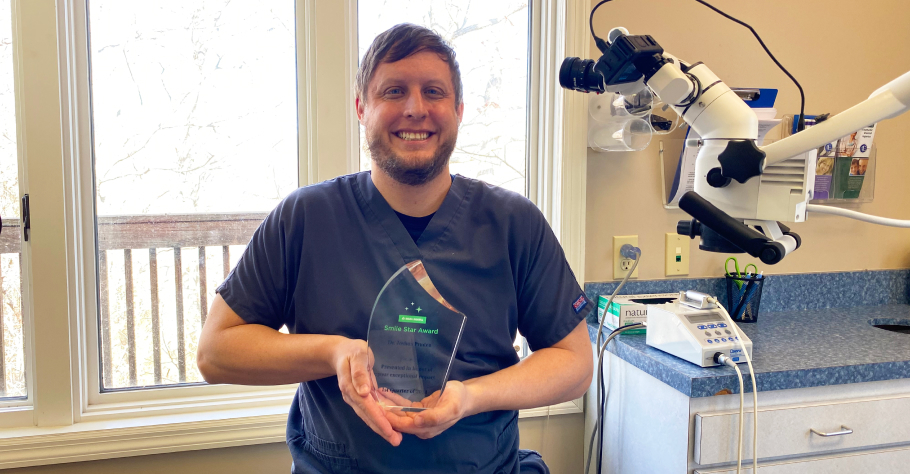
Delta Dental Smile Star has a career based in service
As part of our ongoing effort to recognize the incredible work that those in the dental industry do for their patients and their communities, we’re pleased to announce the Smile Star award. Each quarter, we’ll highlight dental professionals and office staff who have been nominated by their peers in recognition of their exceptional work.
Say hello to the first Smile Star for 2024, Dr. Joshua Pruden. Dr. Pruden is an endodontist and the owner of Pruden Endodontics, serving the Beckley metropolitan area of southern West Virginia. A native son of West Virginia, his path to becoming a dentist took him from West Virginia University to the United States Army. He’s been stationed in Georgia, North Carolina, and Virginia, all the while developing a passion for relieving patients’ pain and helping them keep their natural teeth. As a Smile Star Award winner, we asked Dr. Pruden to share more about his experiences as a dental provider, his viewpoint on service and what he does to increase access to care within the community.
Thanks for your time, Dr. Pruden. Tell me about yourself. If we were meeting for the first time at a conference, what would you want me to know?
I grew up in Dunbar, West Virginia. In high school, I became interested in dentistry and started volunteering at West Virginia Health Right, a state-subsidized clinic for lower income patients, and shadowing at local dental offices. After high school, I went to undergraduate school at West Virginia University, got a Bachelor of Science in Biology and applied to the School of Dentistry. In 2012, I graduated with a Doctor of Dental Surgery.
After graduating, I joined the army and performed dentistry as part of my service. Those first couple years I got really interested in endodontics and root canals. The work itself was challenging and interesting, but I also liked knowing that I was helping to get people out of pain. It’s really rewarding to me when a patient comes to my office in pain and the work that I do helps alleviate it. I wanted to get good at endodontics, so I pursued it and applied for a national residency. I did that in Augusta, Georgia from 2016 to 2018, then worked as an endodontist in the military for three years around the national capital. After nine years in the military, I bought my practice here in Beckley, West Virginia, and have been here since the summer of 2021.
Speaking of your practice, what does a typical day on the job look like for you?
Oh, man! Most days I’m pretty busy, so I see patients from 8 to 4 and typically don’t take lunch. I just do root canal consultations and endodontic surgery, so that’s my typical Monday through Thursday. I also try to volunteer at West Virginia Health Right at least once a month and help out at the residency program at Western Virginia University when I can.
Let’s talk about volunteering. As a Smile Star Award winner, you’ve been identified as someone who makes a real effort to increase access to care in your community and the world.
I like helping people. In my office, I mainly do root canals, but at West Virginia Health Right, I do a lot of less specialized dentistry, like extractions. I also enjoy going overseas as a volunteer dentist. There’s a big need for dentists to help out in a lot of other countries, and not as many dentists are able to step away from their practices to do it.
In 2019, I got involved with an organization called Medical Missions Outreach, which has teams of all kinds of different healthcare professionals. I heard about them because the founder was from the church that I was going to at the time, and one of my sisters and my brother-in-law actually worked for the organization. He was a doctor in Honduras at the time.
They do about 12 to 15 trips a year where they go to an area and link up with a local church for about 10 days. The healthcare professionals come in to provide support, and it’s a good collaboration between the local folks and the visiting professionals. It’s a big draw to me knowing that people’s physical and spiritual needs are both being taken care of. We did a Honduras trip last year, and then we have an upcoming trip to the Dominican Republic in April. I try to do a trip at least once a year, depending on what my schedule allows. It’s definitely easier now that the pandemic travel restrictions have been lessened.
I’ve always liked traveling, and I did a volunteer trip back in dental school, but I had a lot less freedom to do trips while I was serving in the military. I was able to do it one time, but I want to do it on a regular basis now that I’m kind of settled in with my own private practice.
You mentioned that West Virginia is great for your hobbies and getting outdoors. What else do you like to do in your free time?
I stay involved with my church. I spend a lot of time with kids sharing my hobbies and just hanging out. They’re involved in sports, basketball and soccer, so that takes up most of my time right there.
What do you think the future holds for dentistry? What trends, topics and technologies do you find yourself thinking about?
You know, I used to practice in Washington, DC for a few years, and one thing I’ve found is that patients are getting smarter and more informed. They want a personal relationship with their dentists, not just one where they do whatever the dentist says. Patients are also more interested in keeping their teeth than ever before. I think implants are great, and the quality of care that your average patient gets has only gone up as better dental technology becomes more widely available, but patients are more dentally minded than ever and they want to retain what they have rather than replace it. People value their smiles more, especially with social media, virtual meetings at work and all the opportunities we have to sit in front of a camera these days.
I think you’ll also see different kinds of practices in different places, instead of a one-size-fits-all approach for the industry. In some places like cities, you’ll see more dental service organizations where patients just want to be seen in a timely manner. In more rural locations, people will be willing to wait and develop that relationship that you get with a solo practitioner.
What’s some advice that you would give to a recent dental school graduate?
Focus on quality, not speed. Speed will come with experience, but when you’re starting out, find somewhere where you can develop your skills further without the pressure of having to produce a lot. Focus on quality of care, the money and school debt and everything, will be taken care of in time.
It helps, too, to find a dentist to work alongside that’s more experienced. Or if you want to start your own practice, try to have a network of people you can lean on. As a specialist, I interact with a lot of general dentists, and I’ve worked to really develop those relationships. And if you start your own practice early, don’t be afraid to reach out to other dentists when you have questions or need help. You don’t have to be an island.
Also, consider opening a rural practice. There’s a huge need for dentists in rural locations. There’s a lot of things cities can offer, but rural places offer good people and good locations, too.
Thank you, Dr. Pruden. Is there anything else you’d like to discuss before we wrap up?
I just want to say that the biggest reason I like dentistry is the work-life balance. To be able to spend time with my family and the causes that are important to me is such a gift. You can work a lot of hours and make good money, but I like to tell people that the reason I love dentistry is because it’s been great for my family life. It really has. And I’d like to encourage more dentists to volunteer when they can. If you have the time, it’s so rewarding to be able to help people who couldn’t otherwise afford
the care.
Thank you, Dr. Pruden, for your time and for all that you do for your patients and your community. Congratulations on being chosen as our first Smile Star of 2024!
You can visit Dr. Pruden’s personal website for more information on his practice.
Do you know someone who should be a Smile Star? Email us at smileaward@delta.org with their contact information and the reason your nominee should win this award.
Recent posts
- Oral health care for seniors: Improving access, improving outcomes
- Simplify your credentialing with CAQH: Check out our webinar recordings
- Updated 2026 CDT codes are here
- View our CDT 2026 Updates webinar and stay on top of code changes
- EFT will become our standard payment method starting 1/1/27
- Start the year strong: Key reminders to support your practice in 2026
- Discover 3 tips to power up your practice with new workflows
- Updated 2026 CDT codes are here
- Partner with us to improve the health outcomes of our shared members
- Say hello to our 2026 Medicare Advantage DHMO partners
